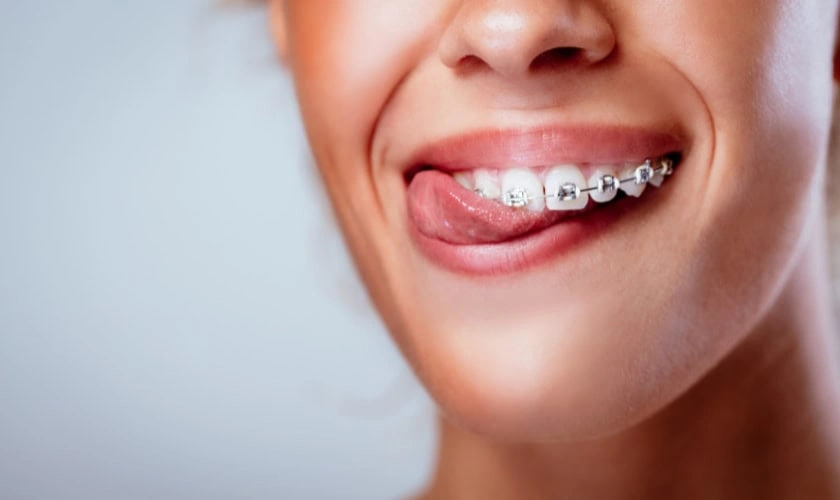
Imagine flashing a smile that radiates confidence. You no longer hide your teeth in photos or hesitate to laugh freely. This is the transformative power of braces, and it goes far beyond achieving a picture-perfect smile. At Ballard Orthodontics, we are passionate about creating beautiful smiles, but we’re even more dedicated to helping patients discover the long-lasting benefits of braces that extend far beyond aesthetics.
While a straighter, more symmetrical smile is certainly a desired outcome, braces offer a multitude of hidden advantages that contribute to your overall oral health and well-being. Let’s delve deeper and explore why braces are an investment in your long-term health and happiness.
The Power of a Perfect Bite: Improved Oral Health with Braces
Our teeth are intricately designed to work together, and misalignment can throw this delicate system off balance. Here’s how braces come to the rescue:
- Correcting Bite Issues: Misaligned teeth can lead to malocclusion, a fancy term for an improper bite. This can cause problems like uneven tooth wear, jaw pain, and difficulty chewing. Braces gradually shift your teeth into their ideal positions, creating a balanced bite that distributes pressure evenly across your jaw.
- Reduced Risk of Gum Disease: Crooked teeth can create pockets where food particles and plaque easily accumulate. This build-up can irritate the gums, eventually leading to gum disease. Braces help align your teeth, making them easier to clean and reducing the risk of gum inflammation and infection.
- Improved Chewing Efficiency: Proper alignment allows your teeth to meet and function optimally. This leads to more efficient chewing, which aids in better digestion and nutrient absorption.
- Reduced Risk of Tooth Decay: Misaligned teeth can sometimes overlap, making it difficult to reach certain areas with a toothbrush. Braces create a more even smile, making it easier to maintain a thorough oral hygiene routine and reducing the risk of tooth decay.
- Enhanced Speech: In some cases, severe misalignment can affect speech patterns. Braces can help correct these issues, leading to clearer and more concise speech.
By addressing these underlying issues, braces not only improve your smile but also lay the foundation for a lifetime of optimal oral health.
The Confidence Boost: Braces and Your Overall Well-Being
The benefits of braces extend far beyond your mouth. A confident smile can have a ripple effect, impacting your overall well-being in surprising ways:
- Enhanced Self-Esteem: A smile is often the first thing people notice. When you feel self-conscious about your smile, it can affect your confidence in social interactions and professional settings. Braces can help you achieve a smile you’re proud to show off, leading to a boost in self-esteem and a more positive self-image.
- Improved Social Interactions: A confident smile can be a powerful social tool. When you feel good about your smile, you’re more likely to smile freely and engage with others openly. This can lead to stronger social connections and a more fulfilling social life.
- Reduced Anxiety: For many people, misaligned teeth can be a source of anxiety, especially in social situations. Braces can alleviate this anxiety by giving you the confidence to smile without reservation.
- Positive Impact on Mental Health: Studies have shown a connection between a positive self-image and mental well-being. The confidence boost associated with a straighter smile can contribute to a happier and healthier you.
Braces for All Ages: Addressing Common Concerns
Many people believe that braces are just for teenagers. However, the truth is that braces can be an effective treatment option for people of all ages.
- Adults and Braces: Technological advancements have made braces more comfortable and discreet than ever before. Adults seeking smile correction can benefit from a variety of options like clear braces, which are virtually invisible.
- Is it Too Late for Braces?: It’s never too late to achieve a healthier, more confident smile. As long as your gums and jawbone are healthy, braces can effectively move your teeth at any age.
- Best Age for Braces: While early intervention can sometimes address minor issues, there’s no single “best age” for braces. The ideal time for treatment depends on the individual’s specific needs and development. A consultation with a Grapevine orthodontist can help determine the best course of action.
Types of Braces:
There are various types of braces available, each with its own advantages:
- Traditional Metal Braces: These are the most common type of braces, offering effective treatment for a wide range of orthodontic problems.
- Clear Braces: Made from clear plastic, these braces are a more discreet option for adults who are concerned about aesthetics.
- Lingual Braces: These braces are attached to the back of your teeth, making them virtually invisible from the front.
During your consultation, your orthodontist will discuss the different types of braces available and recommend the best option for your individual needs and preferences.
Unveiling Your Smile’s Potential
The decision to get braces is transformative. It’s not just about achieving a straight smile; it’s an investment in your long-term oral health, confidence, and overall well-being.
At Ballard Orthodontics, we understand the journey you’re about to embark on. We’re here to guide you every step of the way, from the initial consultation to your final smile reveal.
Frequently Asked Questions
Will braces hurt?
Some mild discomfort is common during the initial adjustment period and after tightening. However, over-the-counter pain relievers can usually manage any discomfort.
How do I care for my braces?
Maintaining a good oral hygiene routine is crucial during treatment. Your orthodontist will provide specific instructions on brushing and flossing with braces.
How long does braces treatment typically last?
The duration of treatment varies depending on the individual’s needs. However, the average treatment time for braces is typically 12-24 months.



